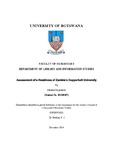| dc.contributor.author | Chipembele, Matuka | |
| dc.date.accessioned | 2016-07-15T06:27:28Z | |
| dc.date.available | 2016-07-15T06:27:28Z | |
| dc.date.issued | 2016-07-15 | |
| dc.identifier.uri | http://hdl.handle.net/10311/1465 | |
| dc.description | A dissertation submitted to the Dept. of Library and Information Studies, Faculty of Humanities, University of Botswana in partial fulfilment of the requirement of the degree of Master of Arts in Library and Information Studies, Citation: Chipembele, M. (2014) Assessment of e-Readiness of Zambia’s Copperbelt University, University of Botswana | en_US |
| dc.description.abstract | Given the influential role that ICTs play in socio-economic development, emphasis is being placed on universities becoming repositories of valuable innovation and human capital to sustain the knowledge economy. Drawing on several sources, including studies from different scholars, theories and emerging literature on the growing role of ICTs in different business processes, it is argued that universities must become e-Ready in order to create service efficiency and ultimately place themselves at a competitive edge. In the same vein, Copperbelt University (CBU) embarked on a number of ICT initiatives in a bid to advancing its core business of teaching and learning, research and community outreach. This study therefore assessed the e-Readiness of Zambia’s CBU. Specifically, the study assessed the extent to which CBU stakeholders; students, academic staff and managers were utilizing and integrating ICTs into its core mandate of teaching and learning, research and community outreach.
This study essentially employed a positivist approach and adopted a case study design coupled with methodological triangulation at the data collection stage where a self-administered questionnaire, interviews and document analysis were used as data collection instruments to understand the e-Readiness of CBU from multiple vantage points. Furthermore, stratified quota and purposive sampling were used to maximise presentation of the study sample comprising third to fifth year students including graduate students and academic staff. Quantitative data collected using questionnaires were entered into SPSS software to generate frequencies and percentages for the research data while qualitative data from interviews was analysed using content analysis techniques. The Network Readiness Index (NRI) model and the Socio-technical theory which underpin the extended Technological Enactment Framework were used as the theoretical lens. The NRI model was used in both developed and developing world to assess e-Readiness of Higher Education Institutions (HEIs). The study investigated to what extent the three main constructs of the NRI model; network usage, environment readiness and readiness to access ICTs influenced e-Readiness indicators and corresponding on the level of e-Readiness at CBU.
The study anticipates contributing to theory through proposing a context-based theoretical framework for appropriate measurement of e-Readiness in the developing world context. Practically, the study highlights the salient factors behind implementation of ICT initiatives in universities in Africa. Lastly, the study recommends that a further study be done that would include students from other academic years and all university staff may be included to achieve statistical significance and representativeness. | en_US |
| dc.language.iso | en | en_US |
| dc.subject | Information communication technology | en_US |
| dc.subject | e-Readiness | en_US |
| dc.subject | Zambia Copperbelt University | en_US |
| dc.title | Assessment of e-readiness of Zambia’s Copperbelt University | en_US |
| dc.type | Masters Thesis/Dissertation | en_US |
| dc.link | Unpublished | en_US |

